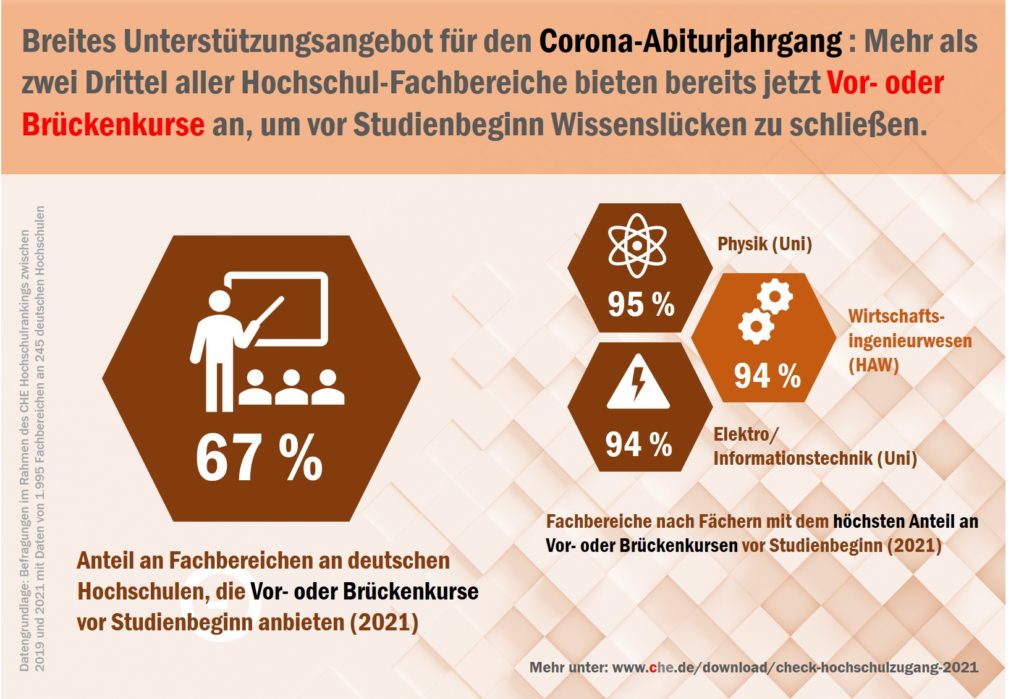 Foto: Lukas Moos / Pixabay
Foto: Lukas Moos / PixabayThe Coronavirus pandemic is having a particular impact on the 2021 intake of Abitur cohorts that are now starting university. Positive facts for prospective students are provided in a current overview drawn up by the CHE Centre for Higher Education. The overview shows that around two-thirds of all university departments already offer preparatory or bridge courses to help new students close any knowledge gaps they may have before starting their studies. In addition, the dominance of Abitur examination grades in the application process for a place at university is continuing to decline.
For years now, so-called bridge or preparatory courses have been offered to enable first-year students to close any knowledge gaps they may have before embarking on their degree programme. It could well be that there will be a lot of demand for such courses next winter semester. After all, the 2021 intake of Abitur cohorts was hit particularly hard by the restrictions caused by the coronavirus pandemic.
The CHE format CHECK on access and induction to higher education in Germany shows that 67 per cent of all departments at higher education institutions (HEIs) offer preparatory or bridge courses. In subjects requiring a knowledge of mathematics, such as physics, computer science and mechanical engineering, almost all departments offer such a refresher course.


In addition, around three-quarters of all departments at Germany’s HEIs offer courses enabling would-be students to acquire the skills required for their chosen degree programme. Examples include seminars on time management or self-management.
“In spite of the many restrictions caused by the coronavirus during the last school year, the present generation of school leavers need not worry about starting university,” Frank Ziegele remarked. “Any knowledge gaps that first-year students may have can be closed at university, whether before or during the start of their degree programme. German HEIs have a broad and comprehensive range of support services for new students, covering the entire introductory phase of their studies. This is a fitting and important development, especially given the current diversity of educational biographies on campus,” stated the CHE Executive Director.
The services on offer include not only tutorials, but also the regular assessment of student progress. For example, 43 per cent of departments already use an early warning system to identify academic problems in the hope of preventing students from withdrawing from their programme at a later stage.
The situation for prospective students has also generally improved with regard to access to higher education. In winter semester 2013/14, for example, more than half of all Bachelor’s degree programmes (52%) were subject to admission restrictions. Last winter semester 2020/21, this was only the case for 42 per cent of such programmes.
Almost all academies of art and music use aptitude tests to determine applicants’ special aptitude for artistic disciplines. Almost half of all departments (45%) already make use of an online version of the aptitude test – referred to as self-assessment. This involves prospective students using an online self-test to determine whether they meet the requirements for embarking on a degree programme in the subject of their choice.
“The dominance of Abitur examination grades in the application process for a place at university is continuing to decline,” stated Cort-Denis Hachmeister. “In around 60 per cent of all Bachelor’s programmes, the Abitur grade no longer plays a role in enrolment outcomes. Other factors such as aptitude tests and practical experience have also grown in importance in the allocation of places for medicine,” commented CHE’s expert in access to higher education.
The author of the “CHECK Hochschulzugang und Studieneingang in Deutschland” (CHECK on access and induction to higher education in Germany) welcomes this development, given that top Abitur grades are no guarantee for predicting academic success and a student’s subsequent aptitude for the profession.
About the publication
The CHE format CHECK provides a quick – primarily visual – overview of a variety of topics. CHE compiled current data from a variety of sources to illustrate the topic of access to higher education. The information on self-assessment and the induction period, based on surveys conducted within the CHE University Ranking between 2019 and 2021, includes data from 1,995 departments at 245 higher education institutions in Germany. Further information on the relevant offers can be found in the CHE University Ranking. The publication entitled “CHECK – Hochschulzugang und Studieneingang in Deutschland” (CHECK on access and induction to higher education in Germany) was written by Sonja Berghoff, Cort-Denis Hachmeister, Marc Hüsch and Jan Thiemann. The entire visual content is available in graphic form in the CHE Flickr cloud: https://www.flickr.com/photos/156160353@N07/albums
